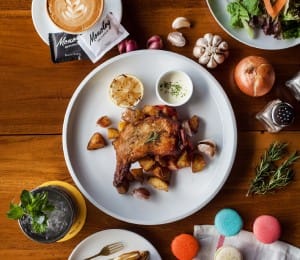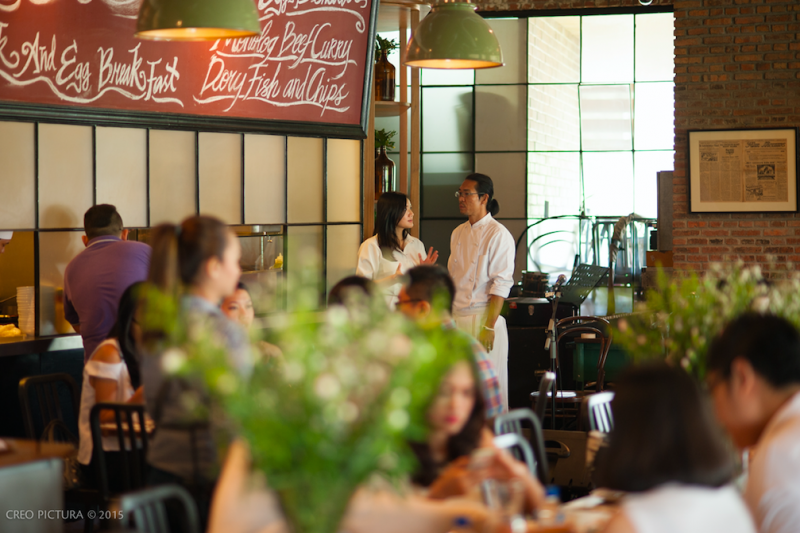If you’ve been to Plaza Senayan or Pondok Indah Mall in Jakarta, chances are you’ve been to Monolog; the coffee shop-cum-all-day-diner popular among both Indonesian and expatriate customers. We meet the head chef, Takashi Iwasawa, and director, Evie Karsoho, to discuss the ins and outs of their successful eatery.
Chef Iwasawa, you’ve been living in Indonesia for over 18 years. Can you share your story of how you ended up living and working here?
Chef Iwasawa: I was eager to see the world. I came to Indonesia back in ‘97 to challenge myself and see how I would sustain living in a foreign country. Jakarta turned up to be my home away from home. Before I joined Monolog, I’ve worked in several restaurants including Italian, Thailand/Vietnamese, Korean BBQ, Indonesian, and Japanese fusion.
You are currently the head chef at Monolog, a very popular coffee shop and restaurant with two branches in Jakarta. Can you explain the restaurant’s concept to us?
Evie: Monolog is your neighbourhood coffee shop/all day diner. Over the years Monolog has served as a focal point for guests to enjoy great coffee and comfort food in a cosy and creative environment, where you can bump into your good friends, family, and very possibly, make new friends.
Whether guests are looking for a hearty breakfast to start the day or a warm blend of home brew coffee and tea in the afternoon – or even tasty cocktails (PIM branch only) come sundown – Monolog carries an extensively varied menu to cater to all.
Monolog is on par with coffee shops in Melbourne, London and Seattle. Why was it important for your team to bring this concept to Jakarta?
Evie: We were inspired by the openness, familiarity, and, of course, quality of some coffee shops from around the world. Being in a country that is one of the biggest coffee producing regions, we feel like we have the responsibility to translate and showcase what we in Indonesia are capable of.
The owner of Monolog, Christoph Darjanto, was a finalist in the Indonesia Barista Competition in 2011. What does it take to truly understand coffee and deliver the best cup each time?
Evie: We believe in three simple things to serve a great cup of coffee; love, passion and quality. We love our coffee, and that’s why we always search for the best quality bean, roasted or even in its raw form.
However, great beans can only translate to great cups through passionate and meticulous preparation, and that’s why at Monolog Coffee we always train our baristas continuously. This way, we can nurture their passion and love for coffee and we can serve great quality coffees consistently.
 What thought and consideration goes into creating each dish on your menu and where do you find your inspiration?
What thought and consideration goes into creating each dish on your menu and where do you find your inspiration?
Chef Iwasawa: I try to understand the local palate and make sure that the ingredients we use are always fresh. Periodically, Evie and I discuss our menu and carry out tastings; we try not to limit ourselves to certain cuisines in the menu creation process. We get inspired by menus from around the world.
What do you think is the secret to the success of Monolog?
Evie: I’ll give you the most cliché answer: we love what we do. It always makes our day when we see that smile and nod of approval in our patrons’ faces when they take that sip of cappuccino or a bite of that Monte Cristo sandwich. We take feedback seriously, whether it comes from our patrons or from our own team. We then evaluate and take action on improvement.
Chef Iwasawa: A solid team.
Your staff are very efficient. What kind of training do your employees undergo?
Chef Iwasawa: We do regular training on our menu to keep the quality consistent and we work with a system.
Evie: We have a SOP (Standard Operating Procedure) for our operational team and we revisit and retrain our team on a regular basis based on the SOP. In the hospitality industry, you are faced with different kinds of people with different kinds of backgrounds every day, therefore flexibility and emotional intelligence is needed. We encourage our team to articulate their minds and use their skills and knowledge to solve problems.
Chef Iwasawa, have you incorporated any Japanese tastes into the menu?
Chef Iwasawa: A few, not much – maybe more on the food preparation techniques rather than the taste.
As a chef of a busy restaurant in Jakarta, what obstacles do you face and how do you deal with these?
Chef Iwasawa: Because of the cultural and language differences, I have had some issues communicating with people, which has sometimes resulted in miscommunication. This is very crucial, especially in the kitchen, where everything is fast-paced and attention to detail is needed. So, I try to self-introspect, adapt, and keep trying to build a solid team. With open communication and optimism, we now have a good team.
Indonesia seems to be entering the ‘organic foods revolution’. Does Monolog also stock organic produce and if so, where do you source from?
Chef Iwasawa: We try to use local products/produce as much as we can, but not necessarily organic. We work very closely with our suppliers to get the freshest produce and ingredients available in the market.
Where are your clientele predominately from and how many patrons do you turnover per day?
Evie: We have a very diverse clientele from Australia, Japan, Southeast Asian countries, USA, European countries, and more. We love the diversity here. It keeps us challenged in delivering service excellence. We turnover more or less 300 patrons per day.
Does PT Gastronomica have any plans to open up a third branch, possibly outside of Jakarta? What are the company’s future plans?
Evie: Certainly. When and where, we don’t know yet. But we’ll let you know for sure!
How is the Indonesian diner different to the Australian diner, for example?
Chef Iwasawa: Menu wise, here at Monolog, we play around and try to be creative with our menu. We try to incorporate some local flavours into our menu, using local spices and ingredients.
What ingredient is the hardest to obtain in Indonesia?
Chef Iwasawa: Believe it or not, fresh seafood.
Do you have any events coming up?
Evie: Yes, we have The Local Table on Saturday 5 December at 10am at our Pondok Indah Branch. We will turn our coffee shop into a gastronomic playground. Chef Iwasawa will be bringing Japanese fusion to our guests with a five-course brunch menu, using only ingredients found in local markets. Music will be performed by KIMA!, a ‘90s hip-hop and R&B cover band, and we will have well known hosts such as the singer Febrian and celebrity chef, Yuda Bustara.
Besides your own restaurant, where is your favourite place to dine in Jakarta?
Chef Iwasawa: Most of the time, I eat at home. I do enjoy the food in Garcon and Olivier.
Thank you, both. To get in touch, please email: [email protected]
—
Monolog
Plaza Senayan CP 101 B, Palm Gate Entrance
Jl. Asia Afrika No. 8 – Jakarta 10270
P +6221 572 5144
Street Gallery 1st floor No. 101 B, Pondok Indah Mall 1
Jl. Metro Pondok Indah – Jakarta 12310
P +6221 2952 9775




